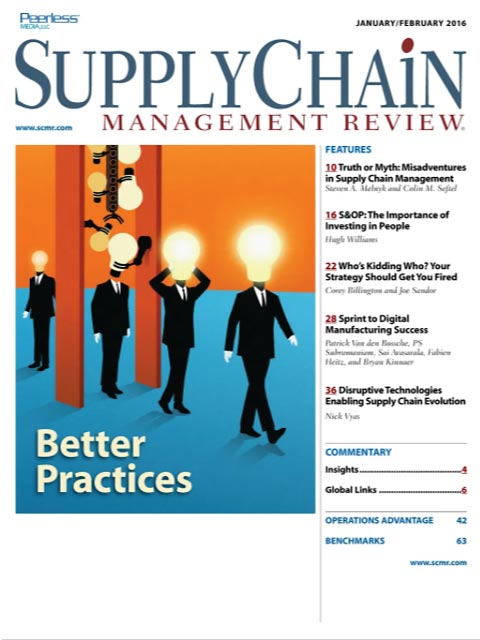Sorry, but your login has failed. Please recheck your login information and resubmit. If your subscription has expired, renew here.
January-February 2016
It’s a new year. Most of us will have new budgets to meet and new expectations for the performance of our supply chains. Many will look to best practices from industry leaders to improve our operations. But, are best practices really the “best” way to go? As you think about 2016, I hope you ask the question: What better practices can I adopt for my supply chain? Browse this issue archive.Need Help? Contact customer service 847-559-7581 More options
I am an early “Baby Boomer” who grew up in the 1960s during the hippie generation. While I was never a hippie—I was too engineering-minded and practical—one thing that has stuck with me from that era is the idea of energy efficiency, especially oil-based energy.
Oil-based Experiences
This mind-set stemmed from the Arab Oil Embargo in the early 1970s. I was a graduate student during those years when gasoline was being rationed. I remember once when my Volkswagen Bug’s gas tank was almost empty and I was desperately looking forward to the day when I could get gas. I worried I’d get stuck on the road running on fumes.
Since then, I have remained conscience of fuel efficiency when buying cars and practice energy efficiency at home. And, I’ve always maintained an eye on oil prices as an interest. However, when I joined MIT to launch the Supply Chain 2020 Project, I was quick to surmise that oil prices were starting to rise steadily. Because of that, I knew that oil prices would be a major factor affecting supply chains in the future. For that reason, the project included research about the potential impacts of oil prices.
 |
This complete article is available to subscribers
only. Click on Log In Now at the top of this article for full access. Or, Start your PLUS+ subscription for instant access. |
SC
MR
Sorry, but your login has failed. Please recheck your login information and resubmit. If your subscription has expired, renew here.
January-February 2016
It’s a new year. Most of us will have new budgets to meet and new expectations for the performance of our supply chains. Many will look to best practices from industry leaders to improve our operations. But, are… Browse this issue archive. Access your online digital edition. |
Download Article PDF |
I am an early “Baby Boomer” who grew up in the 1960s during the hippie generation. While I was never a hippie—I was too engineering-minded and practical—one thing that has stuck with me from that era is the idea of energy efficiency, especially oil-based energy.
Oil-based Experiences
This mind-set stemmed from the Arab Oil Embargo in the early 1970s. I was a graduate student during those years when gasoline was being rationed. I remember once when my Volkswagen Bug's gas tank was almost empty and I was desperately looking forward to the day when I could get gas. I worried I'd get stuck on the road running on fumes.
Since then, I have remained conscience of fuel efficiency when buying cars and practice energy efficiency at home. And, I've always maintained an eye on oil prices as an interest. However, when I joined MIT to launch the Supply Chain 2020 Project, I was quick to surmise that oil prices were starting to rise steadily. Because of that, I knew that oil prices would be a major factor affecting supply chains in the future. For that reason, the project included research about the potential impacts of oil prices.
 |
SUBSCRIBERS: Click here to download PDF of the full article. |
SC
MR

Latest Supply Chain News
- How CPG brands can deliver on supplier diversity promises
- How S&OP provides the answer to in-demand products
- AI, virtual reality is bringing experiential learning into the modern age
- Humanoid robots’ place in an intralogistics smart robot strategy
- Tips for CIOs to overcome technology talent acquisition troubles
- More News
Latest Podcast

 Explore
Explore
Topics
Latest Supply Chain News
- How CPG brands can deliver on supplier diversity promises
- How S&OP provides the answer to in-demand products
- AI, virtual reality is bringing experiential learning into the modern age
- Humanoid robots’ place in an intralogistics smart robot strategy
- Tips for CIOs to overcome technology talent acquisition troubles
- There is still work to do to achieve supply chain stability
- More latest news
Latest Resources

Subscribe

Supply Chain Management Review delivers the best industry content.

Editors’ Picks





